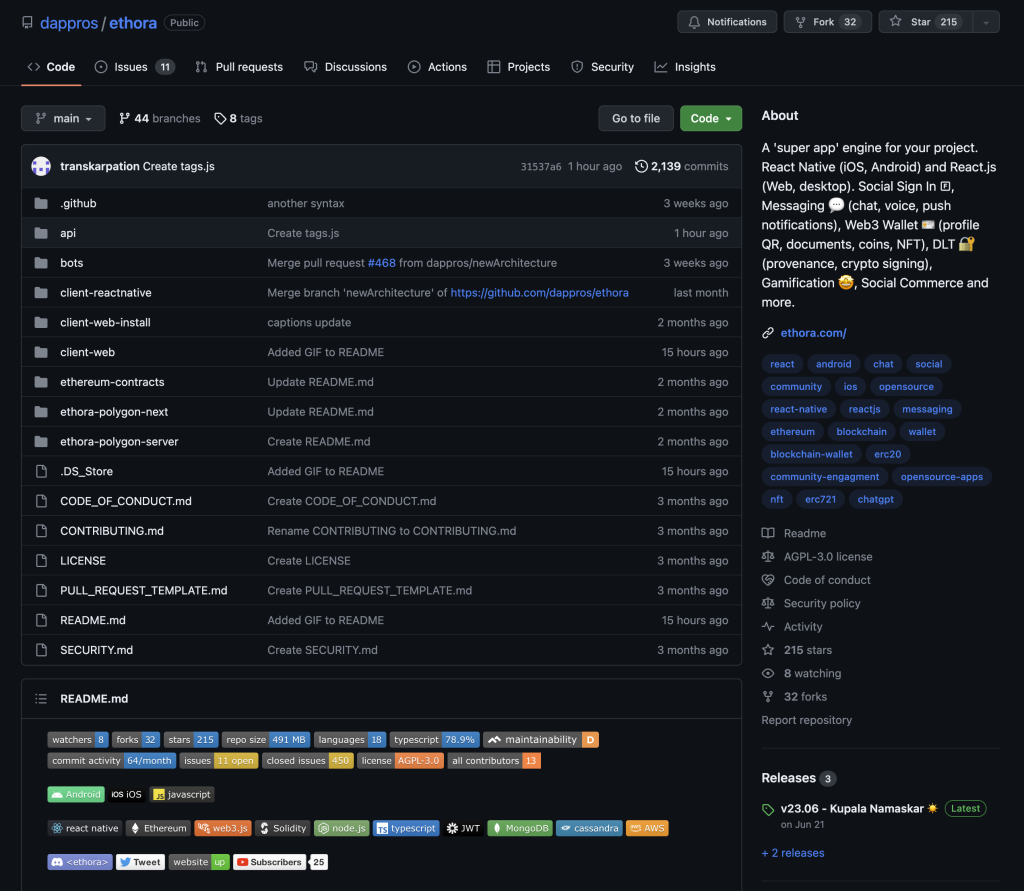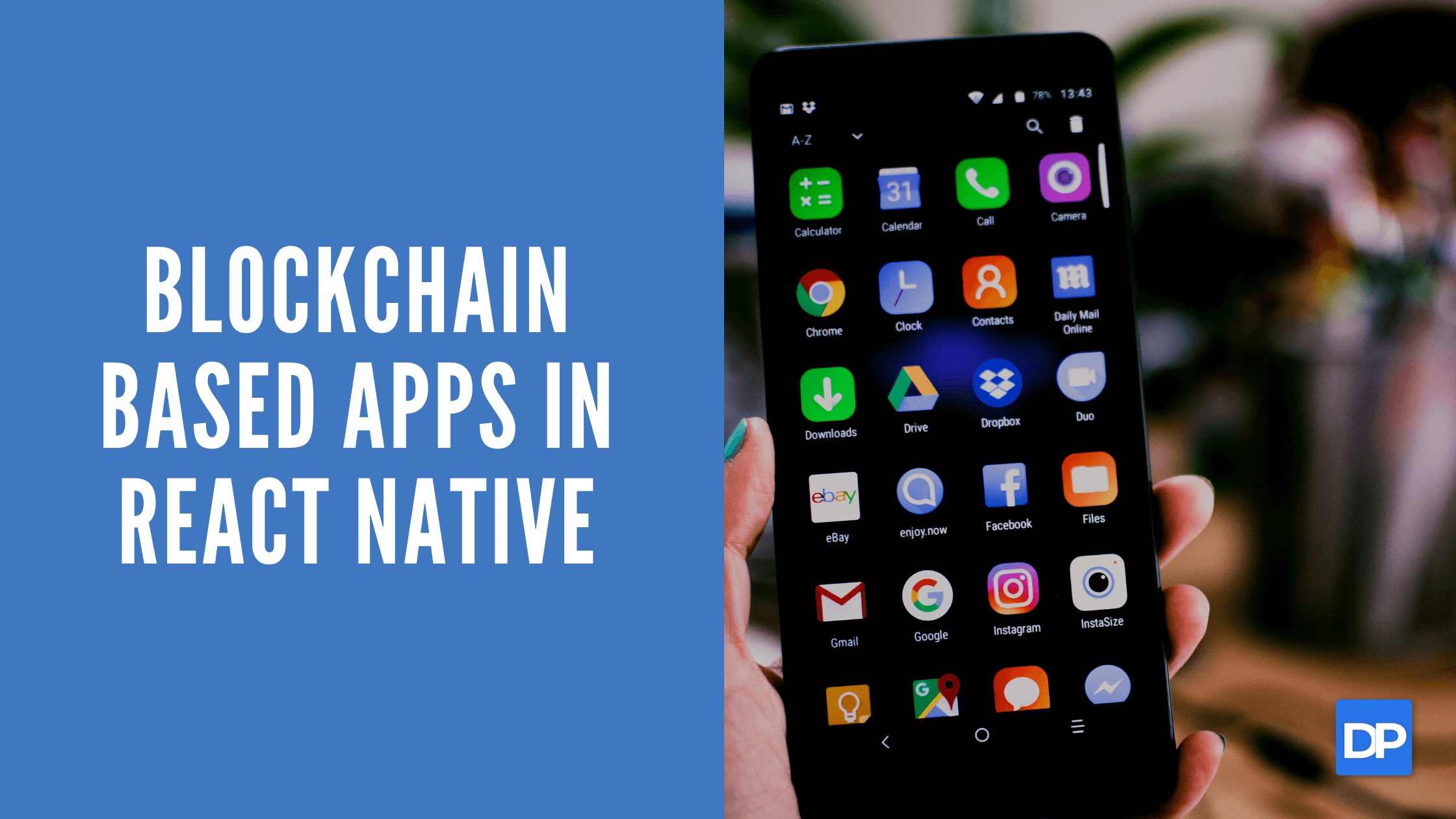Article updated on 11th August 2023
Updated by: Taras Filatov
React Native is one of the most sought-after mobile application frameworks. It makes total sense to choose React Native for your next iOS and Android implementation due to many factors such as it being cross-platform, popular, convenient in development and so on.
Could React Native and blockchain be a winning combination for your next mobile app development project?
Successful applications of blockchain and web3 technologies have been on the rise in several industries such as banking, finance, supply chain, healthcare, securities trading etc over last decade despite adoption being slow and confused by the volatility of the markets and fragmentation of the ecosystem.
Historically, however, save for a few clearly defined categories such as crypto wallets, crypto exchanges and NFT apps, there is very little visible adoption of blockchain and web3 technologies in mobile apps space. While the smartphone and tablet apps development sector remains less explored sector for blockchain implementation we believe this is a clear sign of an opportunity.
Side note N1: why this opportunity is under-explored. We believe this opportunity gap has appeared due to the historical tendency of blockchain and web3 projects to focus on bare minimum implementations where more attention is given to matters such as blockchain network, consensus algorithm, programming languages such as Golang and Solidity ruling this world so far. User interfaces have remained simplistic and oftentimes limited to simple web landing pages with a basic Metamask integration. Now, as web3 isn’t going anywhere and web2.5 is a thing too, it is inevitable that mobile developers working with the tech stacks of iOS Swift, Android Java, React Native and Flutter will increasingly turn their attention to blockchain and web3 implementations.
Side note N2: could this be due to a lack of tools or incompatibility of tech stacks? For sure, it is still much more difficult to find a web3-related library for React Native as opposed, for example to UI kits, animations or messaging. Metamask integration hasn’t been easy until just recently and so on. Web3.js, a Javascript library for communicating to Ethereum blockchain and smart contracts there however is around for several years now (since at least 2016) and is very reliable, fully compatible with React Native and TypeScript implementations. Simply put, web3.js library allows you to communicate directly to dapps (smart contracts) and other on-chain entities from your Javascript (React Native) code doing so via RPC gateway. And if all these words such as web3.js, RPC and smart contracts are a bit too scary for you, there are numerous solutions abstracting away all these things so you don’t ever need to touch them and so that you can keep focusing on writing your React Native code. Server-side solutions include Blockchain-as-a-Service offerings from multiple IaaS providers, API platforms such as Alchemy etc. Client-side, things keep improving as well and nowadays you can find decent low-code / nocode projects and app engines in React Native that fully implement blockchain or web3 functionality so that you don’t have to deal with low level web3.js nitty gritty. See note on our Ethora engine below.
Side note N3: Ethora! Now, Ethora is an open-source React Native and React.js ‘super app’ engine that our company (Dappros) has developed and maintains. Since Ethora exists now you can simply clone it from our Github repo: https://github.com/dappros/ethora, customize the UI and have your own web3 powered React Native app in a matter of hours rather than weeks or months. It includes everything you might need starting from familiar web2.0 features such as SSO (Single Sign-On), chat/messaging and Push Notifications, but also packs a powerful combination of web3 technologies for multiple use cases. Each user has their own wallet where they can store in-app coins, digital assets or documents. Coins are ERC-20 tokens behind the scenes but your users don’t even have to know anything about blockchain or web3 and you can simply use this mechanism for p2p rewards, gamification and retention purposes. All the important mechanisms are built in, for example users get a sign up bonus and daily activity bonus using your internal app coin, and they can also ‘vote’ or reward each other for messages or content using this coin. There is a referral system too – both inviting user and the one joining will receive a coin bonus. It is easy to customize or disable all these features according to your liking or your project needs. To give an example, some projects elect to disable coins and messaging features, however they benefit from using web3 technology for keeping an immutable auditable trace of documents created and exchanged between the users. Our Files and Docs APIs allow users to seamlessly upload and exchange files, as well as wrap them into on-chain trackable documents. This functionality is being used in business applications such as b2b transactioning, health insurance wallet etc. Having built on React Native comes very handy for us as it is super easy to customize and extend functionality depending on each specific project needs.

Ethora on Github: open-source React Native ‘super app’ engine powered by web3.js integrations
Now, back to our discussion and to continue building our case of marrying React Native and web3 tech, just in case you’re not persuaded yet.. Statista says that, as of the first quarter of 2021, there were 3,482,452 and 2,226,823 apps in Google Play Store and Apple App Store, respectively. This data shows that blockchain developers and businesses have a lot to gain from mobile apps.
Blockchain in React Native Mobile Apps: Why Blockchain?
When you need to develop a cross-platform app in React Native mobile applications framework, you should implement blockchain technology for the following reasons:
1. Decentralized and Open Source Structure
Blockchain can help you make your cross-platform app hosting decentralized. Though the central server system for existing mobile apps seems to work fine, however, industry experts believe that data is never safe in a centralized environment.
In a blockchain network, as the source data is decentralized, miscreants will face a hard time hacking your app or its database. Apart from this, scale-up is truly cost-effective in blockchain rather than a centralized server.
2. Extra Layer of Security
Cryptography adds an additional layer of security to your DApp on the blockchain network. Hashing technology helps to retrace the transactions and hence increases the system transparency.
3. Immutable Data Structure
When an authorized user tries to add any data to the blockchain network, they must do it in a sequence. It implies, there is no retroactive addition or deletion of data from the transaction blocks.
This feature is extremely useful when you need to create DApps for banks, financial houses, or stock exchanges. Conventional app development technology becomes costly if you need to implement blockchain-like data traceability.
4. A Better Advertising Model
You can implement the cost-per-attention advertising strategy through React Native apps in Blockchain. The idea is to reward the user directly using in-app coins or any other form.
You can cut down your advertising management cost, which you need to bear in the conventional apps. There are advertising agencies, influencers, and other middlemen that increase the cost within the advertising value chain.
Blockchain in React Native Mobile Apps?
If you plan to develop a DApp, you should choose the most widely used app development platform. What better option you could get than React Native? React Native is the best option and the following benefits of using it justifies the logic:
1. Greater Device Compatibility
React Native app development framework comes from React.js. React.js in turn is a JavaScript library. Therefore, React Native has a wide range of device compatibility.
2. Similar to Native OS UIs
The UI components of React Native framework match vastly with the native device OS. Therefore, the mobile apps look more native, and the designs are in line with the native OS.
3. Code Reusability
React Native is truly a cross-platform mobile app development framework as it offers code reusability. If you use React Native framework for app development, you do not need to code separately for different smartphone OSs like Android, iOS, Blackberry, etc.
4. Easy Debugging and Patching
Mobile app troubleshooting, debugging, and patching become effortless with React Native mobile app framework.
5. Huge UI Component Library
You can use readily available UI components in the React.js library. It cuts down app development turnaround time.
Successful App Examples for App Development Inspiration
There are a few successful Blockchain-based apps built on React Native framework. You can get creative inspiration from the following apps:
1. Stacks Wallet
You can manage your STX tokens in Stacks Wallet. This app is a perfect example of React Native app built using Blockchain. Stacks Wallet grants the following features:
- Use the secret key to generate a new STX address.
- You can accept STX from others to your STX address.
- You can also send STX from your STX address to others.
- You can also view the balance and transaction history.
- You can pay fees when transacting STX.
- Earn BTC by participating in Stacking.
2. Rainbow – Ethereum Wallet
Rainbow Studio made the Rainbow – Ethereum Wallet using Blockchain in React Native cross-platform mobile app development framework. The app is presently available in the App Store for iPhones and iPads. It is a finance category app that helps you explore DeFi and Crypto.
The developers of the app are also working on a project to launch the app in Google Play Store for Android phones. They are welcoming beta testers for the Rainbow – Ethereum Wallet app in Google Play.
3. Coinbase
Coinbase is another example of a successful cryptocurrency trading app built from React Native framework using blockchain technology. Many cryptocurrency traders believe that Coinbase is an effortless app for trading.
You get to learn cryptocurrency trading from the app. Moreover, the app could offer you up to $28 worth of crypto for getting started. Setup is easy, and you can start trading in just a few minutes.
You can get the app from App Store or Google Play Store for the respective devices. The app saw 10,000,000+ installs on the Google Play Store platform. On Apple App Store, it is the #16 app in the finance category.
4. Metamask
Internet users are growing resistant to the conventional sign-up process. The legacy sign-up process is lengthy where you need to enter many details and go through verifications as well. Therefore, social media account-based sign-up or Google account-based sign-up are getting more traction. One such app that can help a user with a one-click sign-up is Metamask.
Metamask helps you prove the ownership of your account or identity through cryptography and a private key. It offers an authentication system built on message signing. Here, the identifier is the user’s public address.
Apart from the one-click log-ins and sign-ups, the app also enables you to trade cryptocurrency. The app is available in Apple App Store and Google Play Store for free. The app saw 1,000,000+ installations in Google Play Store. Additionally, it is the #90 app on App Store in the finance section.
5. Crypto.com
Crypto.com is one of the fastest-growing crypto-exchanging apps globally. As per the developers, the app supports trading of 100+ cryptocurrencies among a 10m+ user base at true cost. The app also offers a lucrative user engagement rewards system through interest earnings.
You can get the Android app from Google Play Store and the iOS app from Apple App Store. More than 10,000,000+ installs show up in Google Play Store. On the Apple App Store, it is the #19 app in the finance category.
Crypto.com app is another best commercially successful React Native apps built with blockchain technology.
6. GitHub: agrcrobles/react-native-blockchain-poll
Blockchain in React Native mobile apps can also help solve online polling problems. One of the best ongoing examples of this is the Expo project on react-native-blockchain-poll.
It is an open-source project of app development, and anyone can review the code from GitHub. The app aims at taking care of crypto punk’s polling systems and rankings on the Ethereum blockchain.
React Native Mobiles Apps in Numbers
React Native is one of the most sought-after cross-platform mobile app frameworks. According to a 2020 research publication in Statista, 42% of app developers said that they use React Native. Some other important numbers are as below:
| Online Platform/ Tech Community | React Native |
| 1. Reddit React Native devs | 78,800 |
| 2. Stack Overflow Questions | 102,531 |
| 3. GitHub Repository Results | 244,682 |
| 4. GitHub Commits | 720,000 |
| 5. Facebook Followers | 111,753 |
| 6. Twitter Followers | 113,500 |
| 7. LinkedIn Group Members | 32,174 |
Blockchain-Based Apps (DApps) In Numbers
Decentralized applications (DApps) run on the principles of distributed ledger technologies (DLT), like the Ethereum blockchain. DApps gaining popularity among developers and companies as these apps offer robust security features that are virtually unhackable.
Developers and businesses have so far explored DApps for decentralized finance (DeFi), cryptocurrencies, online gaming/ gambling, and smart contracts. Know more about DApps by numbers in the below table as of June 2021:
| STATE OF THE DAPPS Parameters | DApp Statistics |
| 1. Total DApps | 3,550 |
| 2. Daily Active Users | 128,430 |
| 3. 24h Transactions | 2.06 Million |
| 4. 24h Volume USD | 258.31 Million |
| 5. Smart Contracts | 6,370 |
| 6. Live DApps | 1,750 |
| 7. DApps in Beta Testing Phase | 292 |
| 8. Ethereum Platform DApps | 2,812 |
The space for blockchain in React Native mobile app development is growing. You will come across many successful DApps on the Internet. If you think you should explore this field, why don’t start now?
Conclusion: React Native is a fantastic mobile app development stack allowing you to build your MVP or a fully-fledged production app fairly easily, covering both iOS and Android platforms.
React Native low-code templates: Did you know there are plenty of React Native-based low-code engines and no-code tools allowing you to build your mobile web3 project even faster? Check our “Nocode, low-code web3 tools” category to learn more and find yourself some useful templates or inspirations from existing codebases.
Need help with your React Native build? Dappros is a leading React Native and Web3 / blockchain development company with presence in UK, U.S., Ukraine and India. We have successfully delivered several commercial blockchain projects in sectors spanning from Healthcare and Finance to Sports and Social. Prior to that, our team members have developed hundreds of iOS/Android native and cross-platform applications, some even featured by Apple in their TV ads! Most importantly, we are the authors of the Ethora web3 ‘super app’ engine built entirely in React Native (plus React.js client if you prefer to have a web/desktop version too). Ethora is open-source and developer friendly. We will be happy to help you be it via using a low-code engine such as our Ethora, building your project from scratch, or simply coaching your React Native developers in regards to best practices of web3.js and tokenization. Just give us a shout to find out more!


